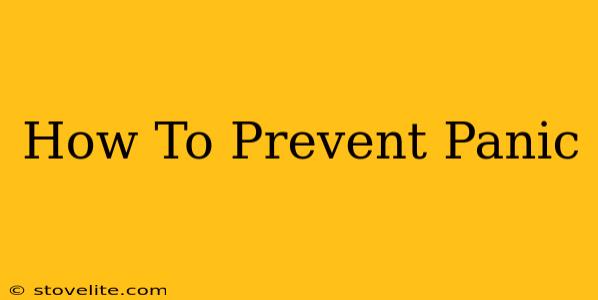Panic attacks. That sudden surge of overwhelming fear, the racing heart, the shortness of breath – they can feel debilitating. But understanding the triggers and implementing proactive strategies can significantly reduce their frequency and severity. This guide offers practical steps to help you prevent panic attacks and regain control over your anxiety.
Understanding Your Panic Triggers
Before you can prevent panic attacks, it's crucial to identify your personal triggers. What situations, thoughts, or physical sensations tend to precede an attack? Keeping a journal can be invaluable. Note down:
- Situations: Were you in a crowded place? Driving? Giving a presentation?
- Physical Sensations: Did you feel dizzy? Short of breath? Experience chest pain?
- Thoughts: What were you thinking before the attack? Were you anticipating something negative?
- Emotions: What emotions did you feel leading up to the attack (e.g., stress, overwhelm)?
Identifying these patterns is the first step towards developing effective prevention strategies.
Practical Strategies to Prevent Panic Attacks
Once you've identified your triggers, you can implement various techniques to manage your anxiety and prevent panic attacks. These include:
1. Cognitive Behavioral Therapy (CBT)
CBT is a highly effective therapy for panic disorder. It helps you identify and challenge negative thought patterns and develop coping mechanisms for stressful situations. A therapist can guide you through techniques like:
- Cognitive restructuring: Identifying and changing negative or catastrophic thoughts.
- Exposure therapy: Gradually exposing yourself to feared situations in a safe and controlled environment.
2. Relaxation Techniques
Practicing relaxation techniques daily can significantly reduce your anxiety levels and make you better equipped to handle stressful situations. Consider incorporating:
- Deep breathing exercises: Slow, deep breaths can calm your nervous system.
- Progressive muscle relaxation: Systematically tensing and releasing different muscle groups.
- Mindfulness meditation: Focusing on the present moment can help reduce overthinking and anxiety.
3. Lifestyle Changes
Certain lifestyle factors can exacerbate anxiety and increase the risk of panic attacks. Making positive changes can make a big difference:
- Regular Exercise: Physical activity releases endorphins, which have mood-boosting effects. Aim for at least 30 minutes of moderate-intensity exercise most days of the week.
- Healthy Diet: Nourishing your body with a balanced diet can improve your overall well-being and reduce stress. Limit caffeine and alcohol, as these can trigger or worsen anxiety.
- Sufficient Sleep: Aim for 7-9 hours of quality sleep per night. Lack of sleep can significantly increase anxiety levels.
- Limit Stress: Identify stressors in your life and develop strategies to manage them. This might involve time management techniques, setting boundaries, or seeking support from others.
4. Medication
In some cases, medication may be necessary to manage panic disorder. Antidepressants, particularly SSRIs (selective serotonin reuptake inhibitors), are often prescribed to help regulate mood and reduce anxiety. It's crucial to consult a doctor or psychiatrist before starting any medication.
Building a Support System
Don't underestimate the power of a strong support system. Talking to trusted friends, family members, or a therapist can provide emotional support and help you cope with challenging situations. Joining a support group can also connect you with others who understand what you're going through.
When to Seek Professional Help
If you're experiencing frequent or severe panic attacks, it's crucial to seek professional help. A therapist or psychiatrist can provide a proper diagnosis and develop a personalized treatment plan. Don't hesitate to reach out for support – you don't have to go through this alone.
Remember: Preventing panic attacks is a journey, not a destination. Be patient with yourself, celebrate your progress, and don't be afraid to seek help when you need it. Taking proactive steps to manage your anxiety can significantly improve your quality of life and help you live a fuller, more fulfilling life.

